1. Companies Leading the Way in CSR
1. Microsoft: Microsoft has long been recognized as a leader in corporate social responsibility (CSR). The company has made significant strides in sustainability, with a commitment to becoming carbon negative by 2030. They have also launched initiatives to address accessibility and digital inclusion, such as the AI for Accessibility program, which aims to leverage artificial intelligence to empower people with disabilities. Microsoft's commitment to CSR extends beyond their own operations, as they actively collaborate with other organizations and governments to drive positive change.
2. Patagonia: Patagonia is a prime example of a company that has integrated social and environmental responsibility into its core business model. The outdoor clothing and gear company has implemented various sustainability initiatives, including using recycled materials, reducing water usage, and promoting fair labor practices. Patagonia also takes a stand on important social issues, using their platform to advocate for the protection of public lands and to support grassroots environmental organizations. Their commitment to transparency and their willingness to share their challenges and progress have made them a role model for other companies.
3. Unilever: Unilever is another company that has demonstrated a strong commitment to CSR. They have set ambitious targets under their Sustainable Living Plan, which focuses on improving health and well-being, reducing environmental impact, and enhancing livelihoods. Unilever has made strides in reducing their carbon footprint, promoting sustainable sourcing, and empowering women in their value chain. They have also launched initiatives like the Dove Self-Esteem Project, which aims to boost self-esteem and body confidence among young people.
4. Danone: Danone, a multinational food-products corporation, has made sustainability a key pillar of their business strategy. They have set goals to become carbon neutral by 2050 and to ensure that their entire value chain is regenerative by 2030. Danone has also implemented initiatives to promote responsible sourcing, reduce water usage, and support local communities. Additionally, the company has been actively involved in addressing global nutrition challenges through initiatives like the Danone Ecosystem Fund and the Danone Nations Cup.
5. Tesla: Tesla's commitment to CSR is evident in their mission to accelerate the world's transition to sustainable energy. The company has revolutionized the automotive industry with their electric vehicles, leading the way in reducing greenhouse gas emissions and promoting clean transportation. Tesla has also made significant investments in renewable energy, with initiatives like the Tesla Gigafactory, which produces batteries and solar products. By pushing the boundaries of sustainable technology, Tesla has become a symbol of innovation and environmental consciousness.
Tips for Companies:
- Set ambitious goals: Companies that aim high and set ambitious targets for their csr initiatives are more likely to drive meaningful change. By challenging themselves, companies can push the boundaries of what is possible and inspire others to follow suit.
- Integrate CSR into the business strategy: CSR should not be treated as a separate department or initiative. Instead, it should be integrated into the core business strategy and embedded into the company's values and operations. This ensures that CSR is not just a PR exercise, but a genuine commitment to making a positive impact.
- Collaborate and share best practices: Collaboration is key to driving collective action and achieving systemic change. Companies should actively collaborate with other organizations, governments, and stakeholders to share best practices, learn from each other, and leverage collective resources for maximum impact.
- Be transparent and accountable: Transparency builds trust and credibility. Companies should be open and honest about their CSR initiatives, sharing both successes and challenges. Regular reporting and accountability mechanisms help keep companies on track and allow stakeholders to evaluate their progress.
Case studies like Microsoft, Patagonia, Unilever, Danone, and Tesla serve as inspiring examples of companies that are leading the way in CSR. By integrating social and environmental responsibility into their core business strategies, setting ambitious goals, and collaborating with others, these companies are driving positive change and redefining the role of businesses in society.
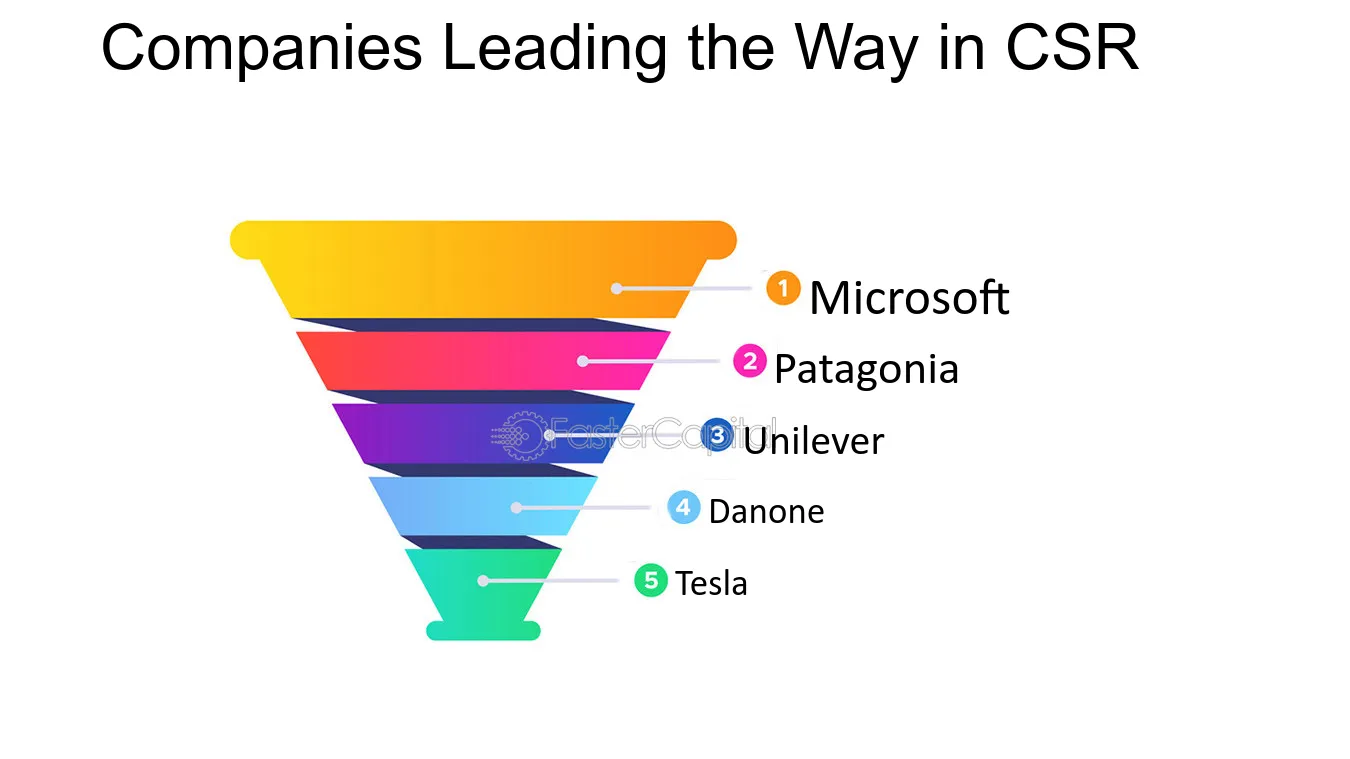
Companies Leading the Way in CSR - Corporate Social Responsibility: From Profit to Purpose: Linking Corporate Governance and Social Responsibility
2. Examples of Companies Leading the Way in Environmental Conservation
Several companies have emerged as leaders in environmental conservation through their corporate social responsibility efforts. Here are a few notable examples:
1. Patagonia: This outdoor clothing brand has long been committed to sustainability. It promotes fair trade practices, uses recycled and organic materials in its products, and donates a percentage of its sales to environmental causes. Patagonia's commitment to the environment is reflected in its mission statement: "Build the best product, cause no unnecessary harm, use business to inspire and implement solutions to the environmental crisis."
2. Interface: Interface, a global flooring company, has made significant strides in reducing its environmental impact. It has implemented a comprehensive sustainability plan called Mission Zero, which aims to eliminate any negative impact on the environment by 2020. Interface focuses on reducing greenhouse gas emissions, waste, and water usage, while also promoting recycling and sustainable sourcing.
3. Unilever: Unilever, a multinational consumer goods company, has integrated sustainability into its business model. It has set ambitious targets under its Sustainable Living Plan, including achieving zero waste to landfill, sourcing 100% of agricultural raw materials sustainably, and reducing the environmental footprint of its products. Unilever's commitment to sustainability has not only earned it recognition but has also contributed to its financial success.
These examples demonstrate how companies can successfully integrate environmental conservation into their CSR initiatives, creating a positive impact on the environment while also benefiting their bottom line.
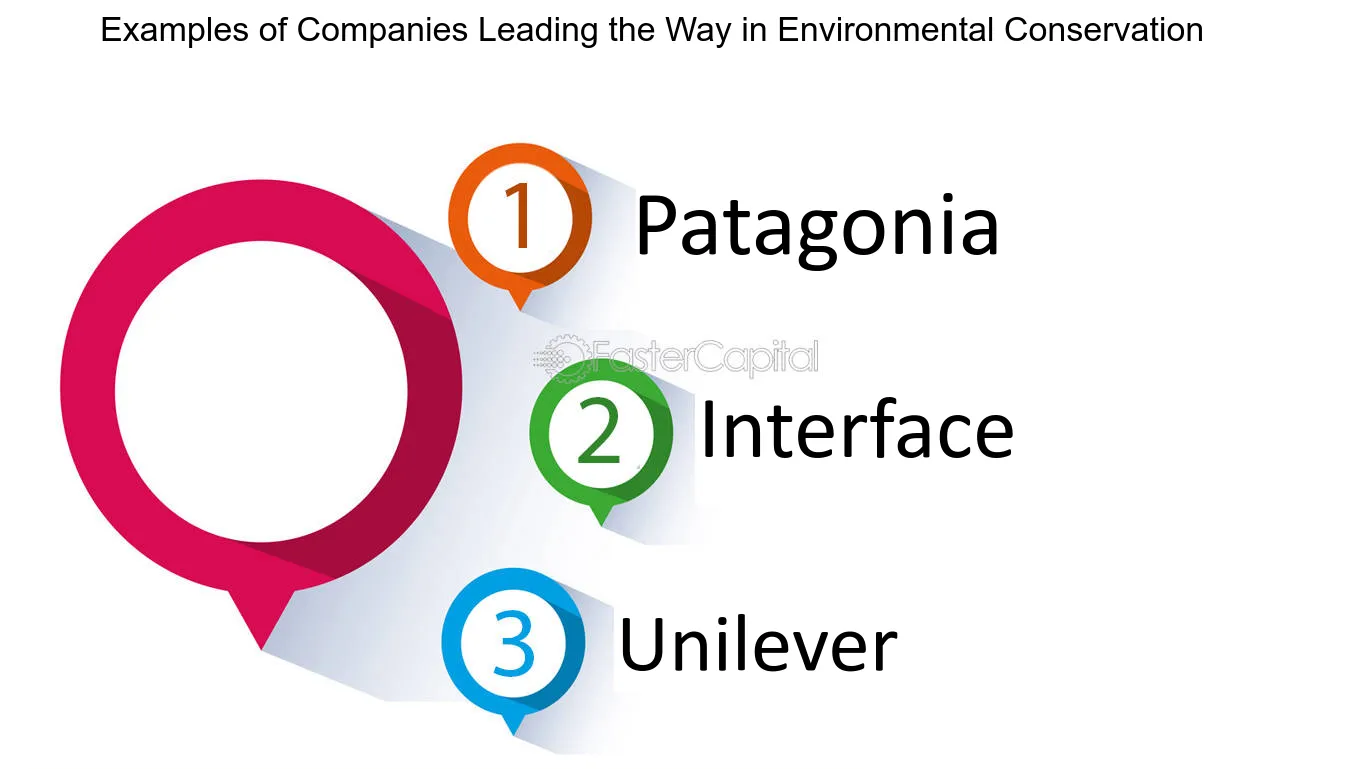
Examples of Companies Leading the Way in Environmental Conservation - Corporate Social Responsibility and Environmental Conservation
3. Companies Leading the Way in Transparency
Section 3: Case Studies: Companies Leading the Way in Transparency
In today's business landscape, companies that prioritize transparency are gaining a competitive edge. By openly sharing information about their operations, practices, and impact, these organizations build trust with stakeholders, including customers, employees, investors, and the wider public. In this section, we will explore a few case studies of companies that have embraced transparency and are leading the way in this crucial aspect of corporate governance.
1. Patagonia: Environmental Stewardship as a Core Value
Patagonia, the renowned outdoor clothing and gear company, has long been a champion of environmental sustainability. The company's commitment to transparency is evident through its annual Environmental and Social Initiatives (ESI) report, where it publicly discloses its supply chain, carbon footprint, and environmental impact. By openly sharing this information, Patagonia not only holds itself accountable but also sets a benchmark for the industry. This commitment to transparency has resonated with customers, resulting in increased brand loyalty and trust.
2. Ben & Jerry's: Social Responsibility Beyond Profit
Ben & Jerry's, the famous ice cream manufacturer, is widely recognized for its social responsibility initiatives. The company's dedication to transparency is exemplified through its annual Social and Environmental Assessment Report (SEAR). This report details the company's progress on various sustainability metrics, including fair trade practices, animal welfare, and community engagement. By openly reporting on its social and environmental impact, Ben & Jerry's not only builds trust with consumers but also inspires other companies to prioritize these values.
3. Microsoft: Leading the Way in Data Privacy
As a technology giant, Microsoft recognizes the importance of data privacy in today's digital age. The company has taken significant steps to enhance transparency and protect user data. Microsoft publishes a biannual Transparency Report that provides insights into the number and types of government requests for user data the company receives. Additionally, Microsoft has embraced the EU's General Data Protection Regulation (GDPR) principles globally, giving users more control over their personal data. By leading the way in data privacy transparency, Microsoft sets a high standard for the tech industry and promotes trust among its users.
4. The Co-operative Group: Ethical Business Practices
The Co-operative Group, a UK-based consumer cooperative, is renowned for its ethical business practices. The company publishes an annual Ethical and Sustainability Report, which outlines its progress on various sustainability goals, such as fair trade, responsible sourcing, and community initiatives. By providing this level of transparency, the Co-operative Group demonstrates its commitment to ethical values and encourages others in the industry to follow suit.
5. Danone: Nurturing Stakeholder Relationships
Danone, a multinational food-products corporation, places a strong emphasis on stakeholder engagement and transparency. The company publishes an annual Integrated Report, which highlights its financial performance alongside its social, environmental, and governance practices. Through this report, Danone showcases its commitment to long-term value creation and the importance of stakeholder relationships. By openly sharing its progress and challenges, Danone builds trust and fosters a deeper connection with its stakeholders.
These case studies illustrate how companies from diverse industries can embrace transparency and enhance trust through public disclosure. By openly sharing information about their social and environmental impact, business practices, and progress, these companies set an example for others to follow. As transparency becomes an increasingly vital aspect of corporate governance, organizations that prioritize this value are not only gaining a competitive advantage but also contributing to a more sustainable and accountable business ecosystem.
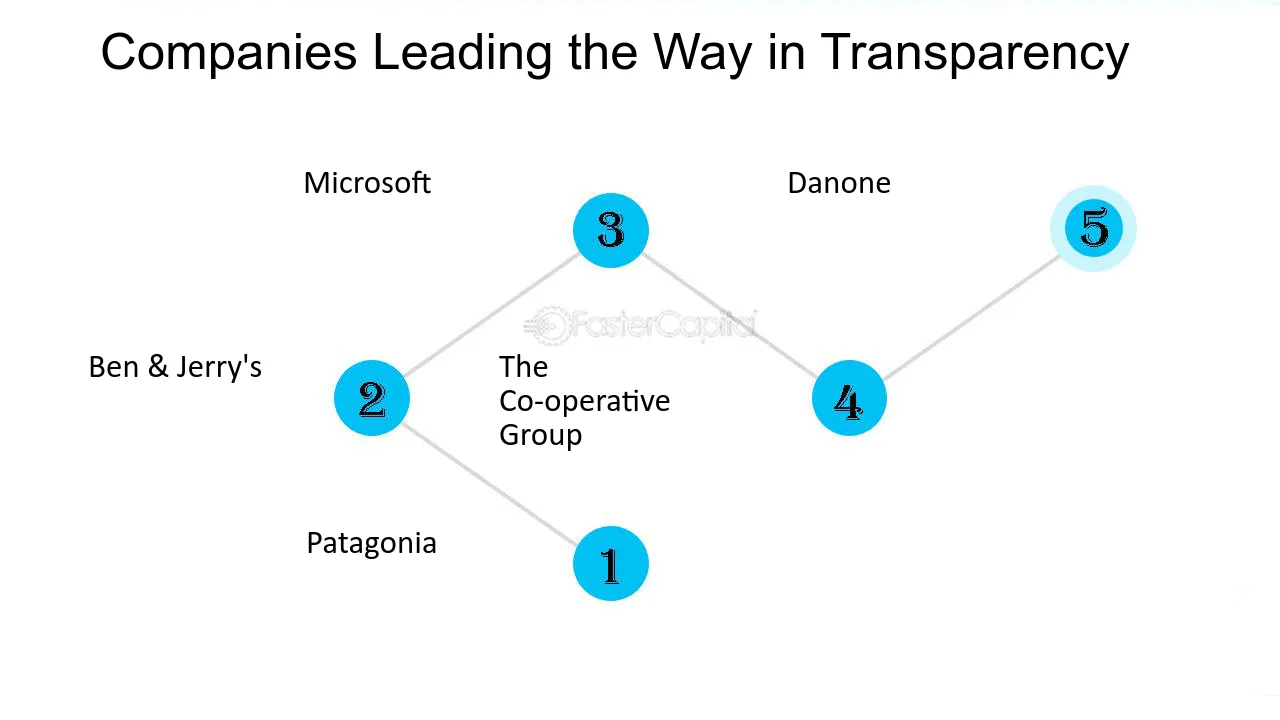
Companies Leading the Way in Transparency - Corporate Transparency: Enhancing Trust Through Public Disclosure
4. Companies Leading the Way in Sustainable SCM
Sustainability is no longer just a buzzword in the business world. It has become an important facet of every organization, and supply chain management (SCM) is no exception. Companies that have successfully integrated sustainability into their SCM practices have found that it not only ensures environmental protection but also leads to economic benefits. These companies are not only pioneers in sustainable SCM, but they are also leading the way for other organizations to follow. In this section, we will look at some of the companies that have successfully implemented sustainable SCM practices and the advantages that come with it.
1. IKEA: IKEA, the Swedish furniture retailer, has become a household name around the world. The company has made sustainability a core part of its business strategy, especially in its SCM practices. It has set ambitious goals such as being energy independent by 2020, sourcing only sustainable cotton, and reducing its carbon footprint by 80% by 2030. IKEA also uses renewable energy sources such as wind and solar power to power its stores. By doing so, the company has not only reduced its environmental impact but also saved costs on energy consumption.
2. Unilever: Unilever, the global consumer goods company, has been at the forefront of sustainable SCM practices. The company has set ambitious goals such as sourcing 100% of its agricultural raw materials sustainably and reducing the environmental footprint of its products by half. Unilever has also implemented sustainable packaging practices, such as using recycled materials and reducing the amount of packaging used. By implementing these practices, the company has not only reduced its environmental impact but also improved its brand image and reputation.
3. Patagonia: Patagonia, the outdoor clothing and gear company, is known for its commitment to sustainability. The company has implemented sustainable SCM practices such as using recycled materials in its products and reducing its carbon footprint. Patagonia has also implemented a program called "Worn Wear," which encourages customers to repair and reuse their clothing instead of buying new ones. By doing so, the company has not only reduced its environmental impact but also created a loyal customer base that shares its values.
4. Walmart: Walmart, the world's largest retailer, has also made sustainability a core part of its business strategy. The company has set ambitious goals such as achieving zero waste, sourcing 100% renewable energy, and selling more sustainable products. Walmart has also implemented sustainable SCM practices such as using fuel-efficient trucks and reducing packaging waste. By implementing these practices, the company has not only reduced its environmental impact but also saved costs on logistics and improved its brand image.
Sustainable SCM practices have become a necessity for organizations looking to achieve long-term success. Companies that have successfully integrated sustainability into their SCM practices have not only ensured environmental protection but also gained economic benefits. The case studies discussed above provide insights into the strategies and practices that these companies have implemented to achieve sustainable SCM.

Companies Leading the Way in Sustainable SCM - From Responsibility to Advantage: Leveraging Sustainability in SCM
5. Case Studies: Companies Leading the Way in Inclusive Design
1. Apple: Pioneering Inclusive Design with Accessibility Features
Apple has long been recognized as a leader in inclusive design, and their commitment to accessibility features is a prime example of their dedication to creating products that can be used by everyone. Their range of accessibility features, such as VoiceOver, Switch Control, and AssistiveTouch, enable individuals with visual, hearing, physical, and cognitive disabilities to use Apple devices with ease. These features not only enhance the user experience for individuals with disabilities but also provide a unique selling point for Apple's products, making them appealing to a wider audience.
2. Microsoft: Empowering People with Disabilities through Technology
Microsoft is another company that has made significant strides in inclusive design. Their accessibility initiatives focus on empowering individuals with disabilities by providing them with tools and technologies that enable them to fully participate in society. One notable example is the Microsoft Seeing AI app, which uses artificial intelligence to describe the world to people with visual impairments. This app not only assists users in navigating their surroundings but also opens up new opportunities for independence and inclusion. Through their commitment to inclusive design, Microsoft has not only improved the lives of individuals with disabilities but also positioned themselves as a leader in creating inclusive technology.
3. Starbucks: Creating Inclusive Spaces for All
Inclusive design is not limited to technology companies. Starbucks, the popular coffeehouse chain, has also embraced the concept of inclusive design by creating welcoming spaces that cater to the needs of a diverse customer base. Their efforts include implementing wheelchair-accessible entrances, providing braille menus, and training their staff to be inclusive and accommodating to customers with various disabilities. By prioritizing inclusivity, Starbucks has not only created an environment where everyone feels welcome but has also positioned themselves as a socially responsible brand that values diversity and accessibility.
4. Airbnb: Ensuring Accessible Travel for All
Airbnb, the online marketplace for lodging and experiences, has recognized the importance of inclusive design in the travel industry. They have taken steps to ensure that their platform is accessible to all users, regardless of their physical abilities. For instance, Airbnb offers filters that allow users to search for accommodations that meet specific accessibility requirements, such as wheelchair accessibility or step-free access. By providing these options, Airbnb is not only making travel more accessible for individuals with disabilities but also tapping into a market segment that has long been overlooked.
5. Nike: Designing Inclusive Athletic Gear
Nike has been at the forefront of inclusive design in the athletic industry. They have introduced innovative products and technologies that cater to the needs of athletes with diverse abilities. One such example is the Nike FlyEase, a shoe designed to be easily put on and taken off, making them accessible to individuals with limited mobility. Nike's commitment to inclusive design not only empowers athletes with disabilities but also challenges the traditional notions of athleticism and sets the stage for a more inclusive and diverse sporting community.
In conclusion, these case studies highlight how companies like Apple, Microsoft, Starbucks, Airbnb, and Nike are leading the way in inclusive design. By considering the needs of individuals with disabilities and incorporating inclusivity into their products, services, and spaces, these companies are not only driving business growth but also fostering innovation and making a positive impact on society. Their examples serve as inspiration for other businesses to embrace inclusive design and create a more inclusive and accessible world for all.
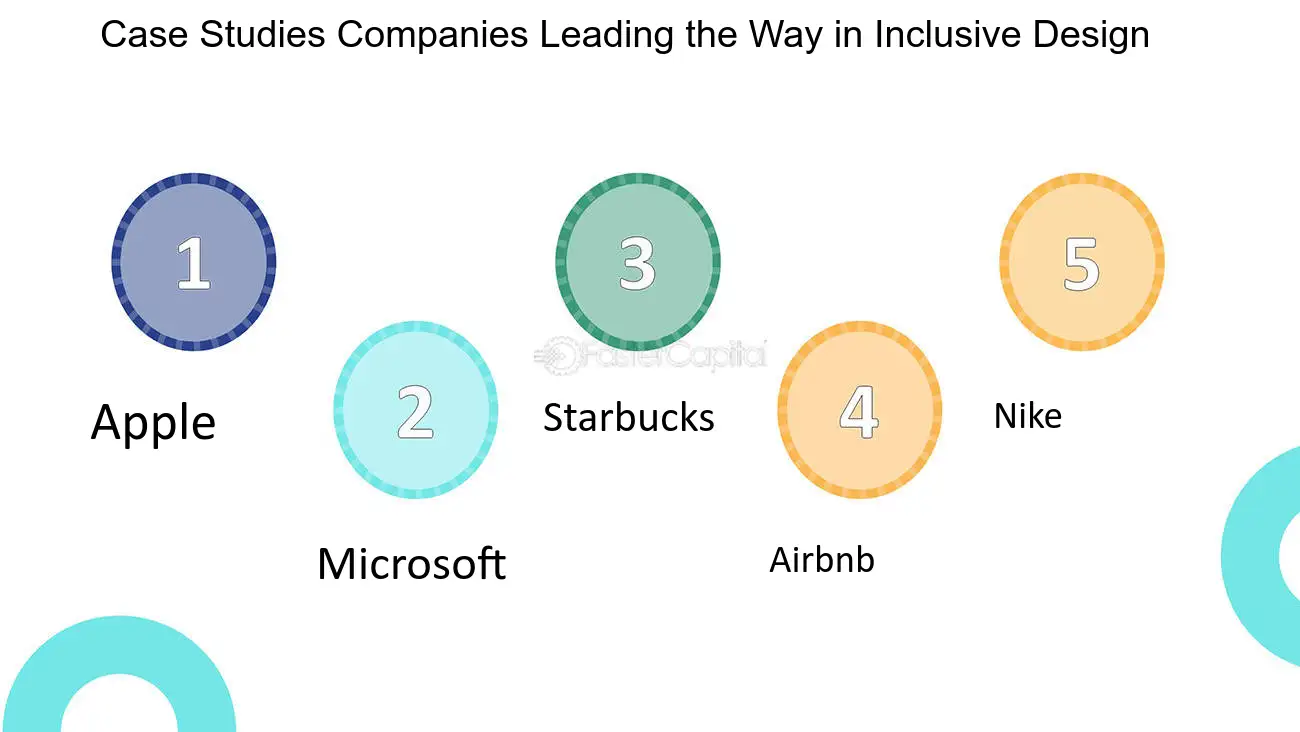
Case Studies: Companies Leading the Way in Inclusive Design - How Inclusive Design Can Drive Business Growth and Innovation
6. Innovative Companies Leading the Way
In the world of business, innovation is the key to success. Companies that are able to innovate and adapt to changes in the market are the ones that thrive and stay ahead of the competition. In this section, we will explore some of the most innovative companies that are leading the way and driving corporate culture with their groundbreaking ideas and initiatives.
1. Apple - Apple is known for its innovative products and design. From the iPhone to the iPod, Apple has been at the forefront of technology and has transformed the way we interact with our devices. The company also has a strong corporate culture that focuses on creativity, collaboration, and innovation.
2. Google - Google has become synonymous with innovation. The company's search engine revolutionized the way we search for information on the internet, and its other products and services, such as Google Maps and Google Drive, have changed the way we work and communicate. Google's corporate culture is one that encourages creativity and experimentation, with employees given the freedom to work on personal projects and pursue their own interests.
3. Amazon - Amazon has disrupted the retail industry with its innovative approach to e-commerce. The company's Prime service has changed the way we shop online, with free two-day shipping and a host of other benefits. Amazon is also investing heavily in artificial intelligence and machine learning, which has the potential to transform the way we live and work.
4. Tesla - Tesla is a leader in the electric vehicle market, and its CEO, Elon Musk, is known for his innovative ideas and bold vision for the future. Tesla's cars are not only environmentally friendly, but they are also stylish and packed with technology. The company is also working on developing self-driving cars, which could change the way we think about transportation.
These companies are just a few examples of how innovation drives corporate culture and leads to success. By focusing on creativity, collaboration, and experimentation, they are able to stay ahead of the curve and continue to push the boundaries of what is possible.
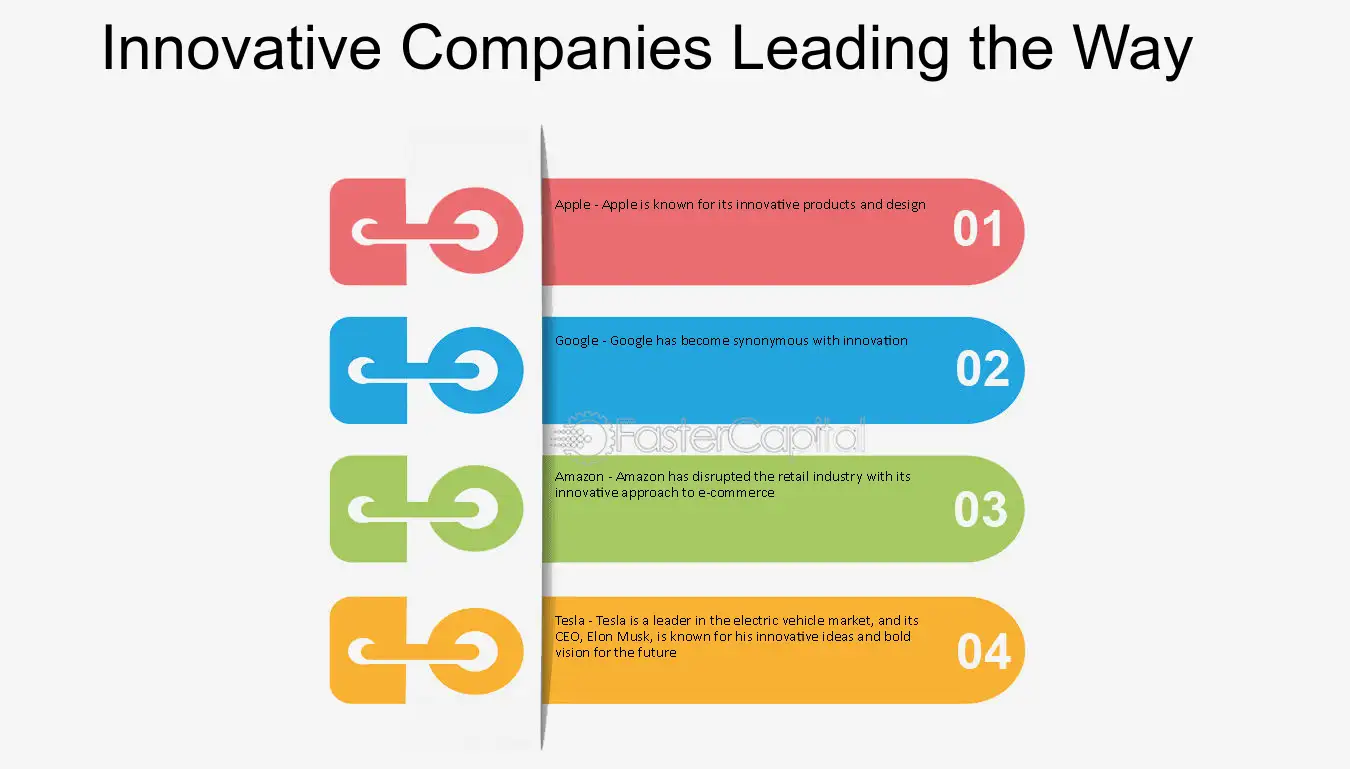
Innovative Companies Leading the Way - Innovation: Fueling Creativity: How Innovation Drives Corporate Culture
7. Companies Leading the Way in Transparent Disclosure
In today's era of heightened consumer awareness and demand for product safety, companies are increasingly recognizing the importance of transparent disclosure. By openly sharing information about their products and manufacturing processes, these companies are instilling trust and confidence in their customers. In this section, we will explore some notable case studies of companies that are leading the way in transparent disclosure, shedding light on their innovative practices and the benefits they bring.
1. Patagonia: Known for its commitment to environmental sustainability, Patagonia has become a trailblazer in transparent disclosure. The company provides detailed information about the materials used in its products, including the environmental impact of each material. Through its Footprint Chronicles, Patagonia takes customers on a journey from raw material sourcing to production, highlighting the social and environmental impact at each stage. By being open about their supply chain and manufacturing processes, Patagonia enables customers to make informed choices and holds itself accountable for its actions.
2. Everlane: Everlane, a popular clothing brand, is renowned for its radical transparency. The company believes in revealing the true cost behind every product, including the breakdown of materials, labor, transportation, and duties. Everlane's "Transparent Pricing" approach allows customers to understand the value they are receiving and ensures fair wages and ethical practices throughout the supply chain. By sharing this information, Everlane empowers consumers to make conscious purchasing decisions and supports a more sustainable fashion industry.
3. Tesla: As a leader in the electric vehicle industry, Tesla goes above and beyond in its commitment to transparent disclosure. The company publishes an annual Impact Report that provides detailed information on its environmental impact, including greenhouse gas emissions and energy consumption. Moreover, Tesla openly shares its safety data, crash test results, and ongoing improvements to ensure the highest level of product safety. By prioritizing transparency, Tesla not only builds trust with its customers but also contributes to the advancement of sustainable transportation.
4. The Honest Company: Founded by actress Jessica Alba, The Honest Company has made transparency its core value. The company specializes in safe and sustainable household products, and it discloses all the ingredients used in its formulations. The Honest Company's website provides comprehensive explanations of each ingredient, highlighting potential health concerns or environmental impacts. This level of transparency enables customers to make informed choices and ensures that The Honest Company maintains its commitment to safety and sustainability.
5. Seventh Generation: Seventh Generation, a leading brand in eco-friendly household products, has long been a champion of transparent disclosure. The company discloses all ingredients used in its products, even those not legally required to be disclosed. Seventh Generation also shares its product testing protocols and certifications to give customers peace of mind. By being transparent about its ingredients and testing practices, Seventh Generation demonstrates its commitment to product safety and environmental responsibility.
6. Whole Foods Market: Whole Foods Market, a grocery chain focused on natural and organic products, places a strong emphasis on transparent disclosure. The company requires all its suppliers to disclose detailed information about their products, including ingredients, sourcing, and manufacturing processes. This commitment to transparency allows customers to make informed choices about the products they purchase and aligns with Whole Foods Market's mission of providing high-quality, sustainable, and ethically sourced products.
These case studies exemplify how companies can lead the way in transparent disclosure, fostering trust, and ensuring product safety. By openly sharing information about their products, supply chains, and manufacturing processes, these companies empower consumers to make informed choices, support sustainability, and hold companies accountable for their actions. As consumers continue to prioritize transparency and product safety, it is crucial for companies to follow in the footsteps of these industry leaders and embrace transparent disclosure as a fundamental principle.
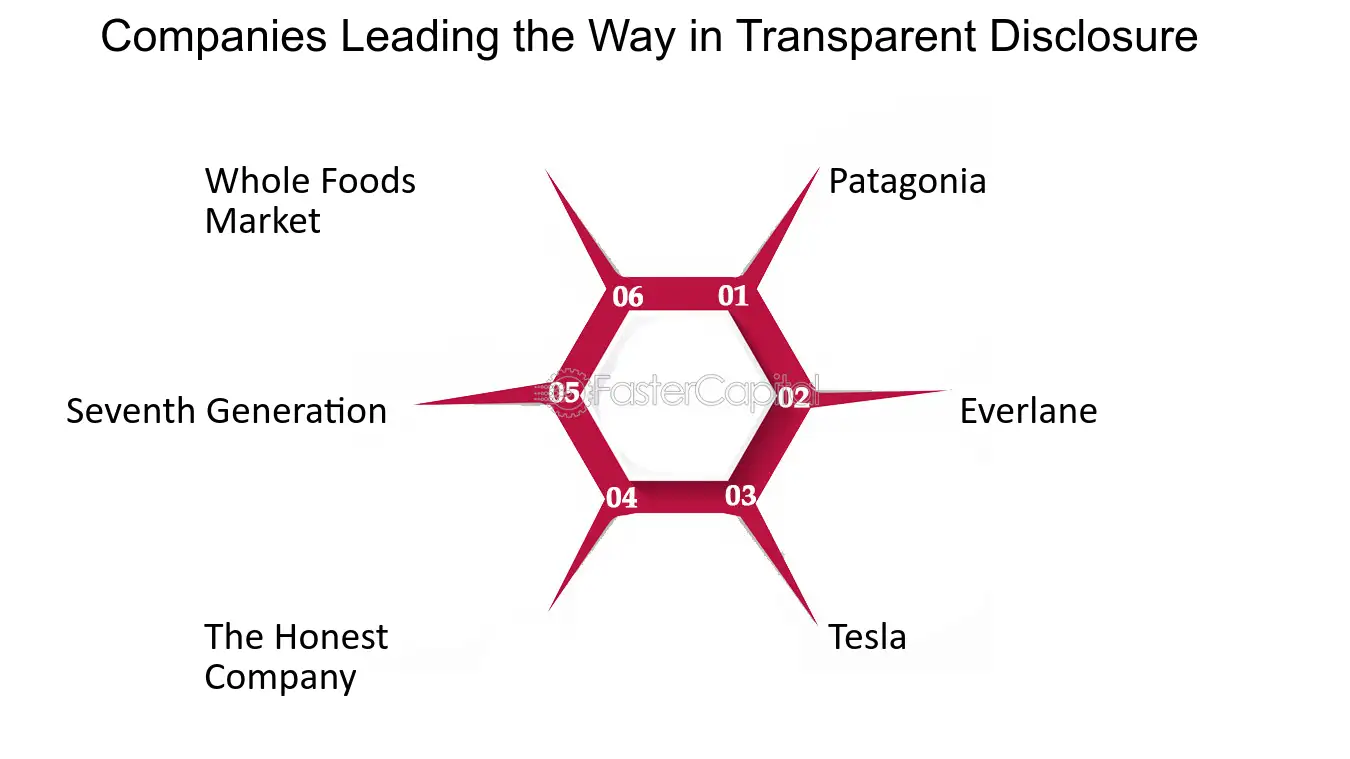
Companies Leading the Way in Transparent Disclosure - Product Safety: Transparent Disclosure: Ensuring Product Safety
8. Companies Leading the Way in Fugitive Emissions Reduction
1. Chevron Corporation: Pioneering Fugitive Emissions Reduction Strategies
Chevron Corporation, one of the world's largest energy companies, has been at the forefront of reducing fugitive emissions across its operations. With a strong commitment to environmental stewardship, Chevron has implemented innovative strategies and technologies to minimize leaks and improve overall efficiency.
One of Chevron's notable success stories is the application of optical gas imaging (OGI) technology. By utilizing infrared cameras, the company can detect and visualize otherwise invisible emissions, enabling prompt identification and repair of leaks. This proactive approach has not only reduced fugitive emissions but also enhanced the safety of their facilities and surrounding communities.
Furthermore, Chevron has implemented a robust leak detection and repair (LDAR) program, which involves regular monitoring and maintenance of equipment to identify and mitigate potential leaks. By utilizing advanced monitoring technologies and employing trained technicians, Chevron has been able to significantly reduce fugitive emissions and minimize environmental impact.
2. ExxonMobil: harnessing Advanced technologies for Emissions Control
ExxonMobil, another global leader in the energy sector, has made substantial progress in reducing fugitive emissions through the adoption of advanced technologies and rigorous monitoring practices. The company's commitment to continuous improvement has driven them to develop and implement innovative solutions.
One successful example of ExxonMobil's efforts is the use of advanced drones equipped with gas detection sensors. These drones can swiftly survey large areas, such as refineries or gas plants, and identify potential leakage points. By leveraging this technology, ExxonMobil has been able to detect and repair leaks more efficiently, resulting in significant reductions in fugitive emissions.
Additionally, ExxonMobil has implemented a comprehensive training program to ensure that their employees are well-equipped to identify and address fugitive emissions. This includes educating operators on the importance of leak prevention, providing them with the necessary tools and knowledge to detect leaks, and empowering them to take immediate corrective actions.
3. Shell: Collaborative Initiatives for Emissions Reduction
Shell, a multinational energy company, has taken a collaborative approach to tackle fugitive emissions by partnering with industry peers and sharing best practices. Through collaborations and joint initiatives, Shell has been able to drive collective action and accelerate progress in emissions reduction.
One notable collaboration is the Oil and Gas Climate Initiative (OGCI), a voluntary initiative that brings together major oil and gas companies to address climate change. As a founding member of OGCI, Shell actively participates in research and development efforts focused on fugitive emissions reduction. By pooling resources and expertise, the initiative aims to develop and deploy innovative technologies and practices across the industry.
Moreover, Shell has invested in the development of advanced monitoring and control systems to enhance leak detection and prevention. By utilizing real-time data analytics and machine learning algorithms, Shell can identify potential leaks more accurately and take swift corrective actions. This proactive approach has not only reduced fugitive emissions but also improved operational efficiency and reduced downtime.
These success stories highlight the commitment of leading companies in the energy sector to reduce fugitive emissions and minimize their environmental impact. By implementing innovative technologies, robust monitoring programs, and collaborative initiatives, Chevron, ExxonMobil, and Shell have set a commendable example for the industry. It is through such efforts that we can move towards a more sustainable future, where fugitive emissions are effectively controlled, and our environment is preserved for generations to come.
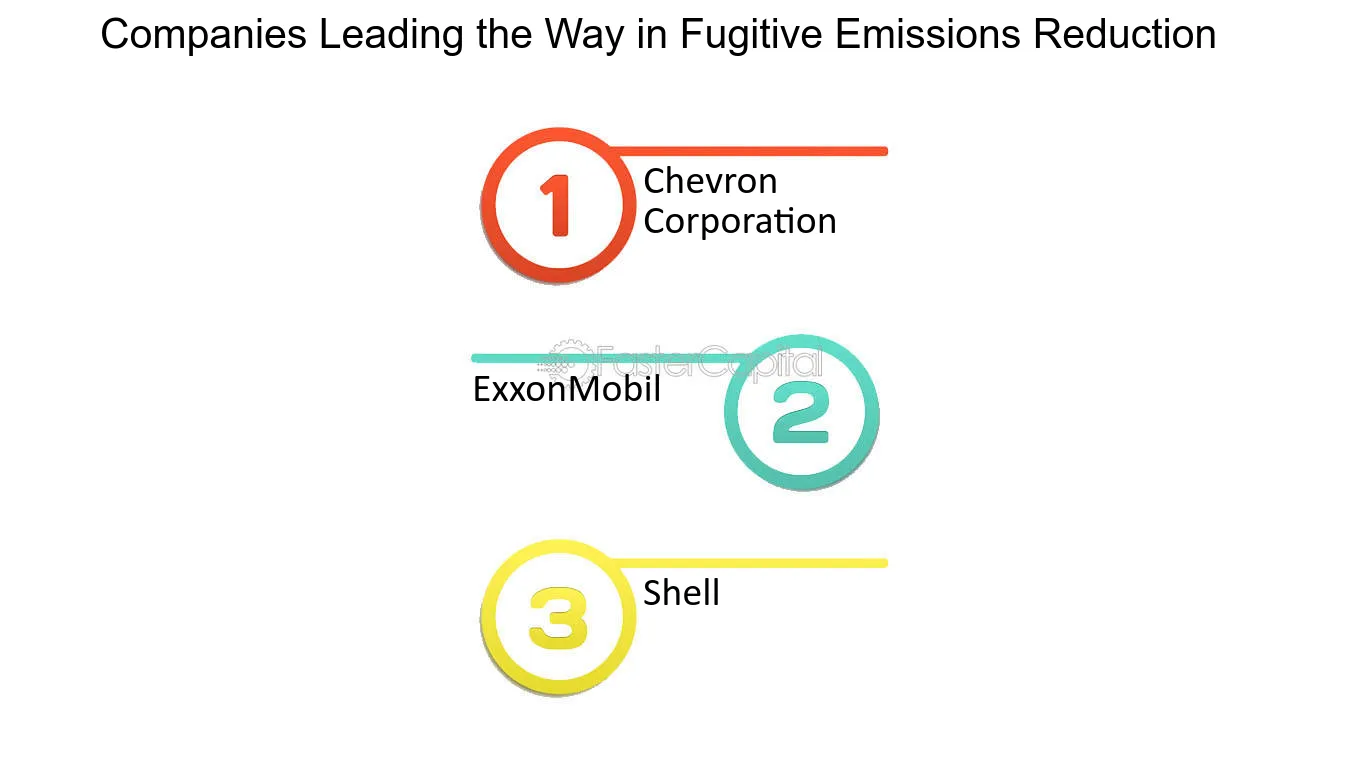
Companies Leading the Way in Fugitive Emissions Reduction - Reducing Environmental Impact: Controlling Fugitive Emissions
9. Top Companies in Leading Sectors
When it comes to investing in the stock market, choosing the right sector to invest in is a crucial decision. Each sector has its own unique characteristics, and some sectors may outperform others depending on the current economic climate. For instance, if the economy is booming, the technology sector may perform better than the healthcare sector. On the other hand, if the economy is in a recession, the healthcare sector may be a safer bet than the technology sector.
To help investors make informed decisions, we have compiled a list of the top companies in leading sectors. This list can serve as a guide for investors who are looking to diversify their portfolio or invest in a specific sector.
1. Technology sector: Apple Inc., Microsoft Corporation, Amazon.com Inc., Alphabet Inc., Facebook Inc. These companies are some of the biggest players in the technology industry, with a combined market capitalization of over $6 trillion. They have been driving innovation and growth in the sector, and their products and services have become an integral part of our daily lives.
2. Healthcare sector: Johnson & Johnson, Pfizer Inc., Roche Holding AG, Novartis AG, Merck & Co., Inc. These companies are leaders in the healthcare industry, with a focus on pharmaceuticals, medical devices, and consumer healthcare products. They have a strong track record of developing new drugs and treatments, and their products are used by millions of people worldwide.
3. Consumer goods sector: Procter & Gamble Co., Nestle SA, Coca-Cola Co., PepsiCo Inc., Unilever PLC. These companies are household names, with a long history of providing essential products and services. They have a wide range of products, including food and beverages, personal care products, and home care products.
4. Financial sector: JPMorgan Chase & Co., Bank of America Corp., Wells Fargo & Co., Citigroup Inc., Goldman Sachs Group Inc. These companies are some of the largest financial institutions in the world, providing a wide range of financial services to individuals and businesses. They have a strong reputation for stability and reliability, and their services are essential to the functioning of the global economy.
Understanding the leading companies in different sectors can be a valuable tool for investors. By diversifying their portfolio and investing in top companies in leading sectors, investors can reduce risk and potentially maximize returns. However, it is important to conduct thorough research and analysis before making any investment decisions.
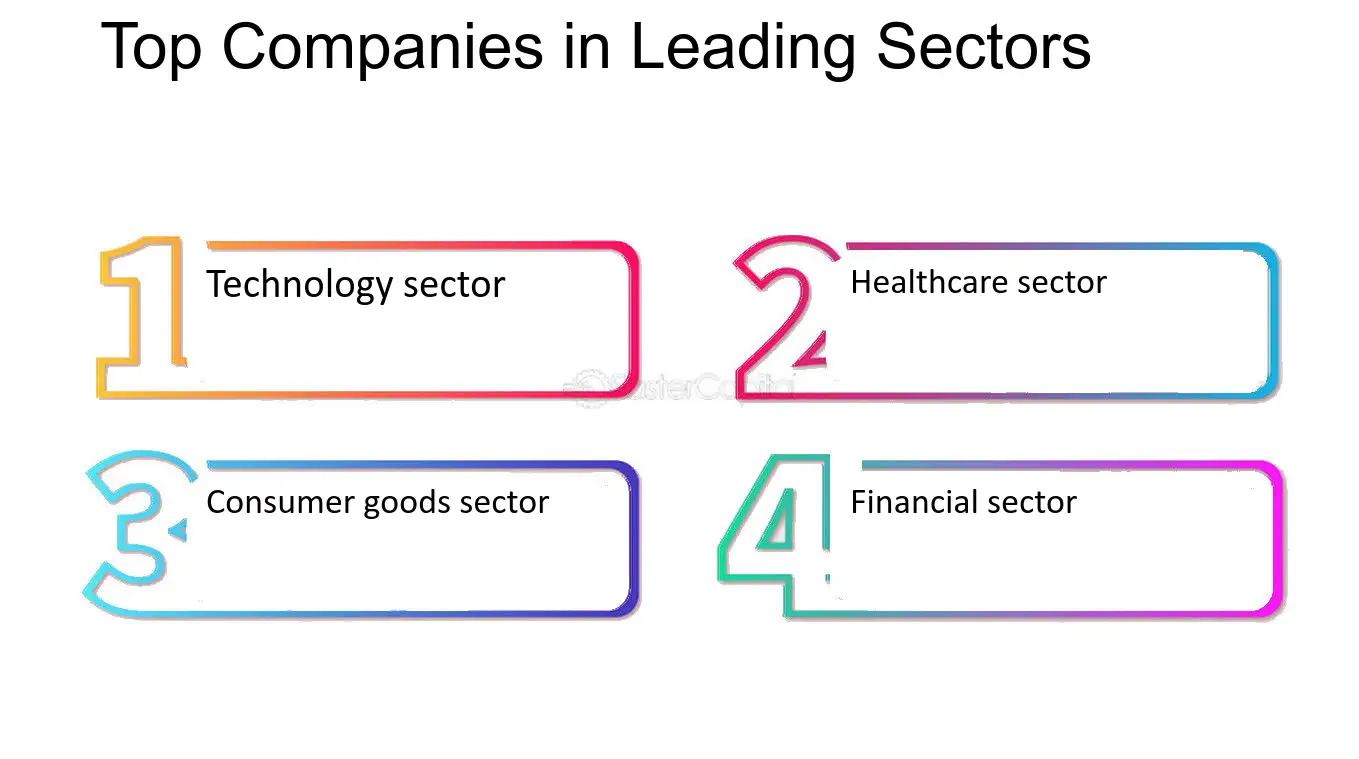
Top Companies in Leading Sectors - Strategic Sectoral Allocation with MSCI BRIC Index
10. Companies Leading the Way in Supply Chain Transparency
1. Patagonia: A Trailblazer in Supply Chain Transparency
One company that has consistently been at the forefront of supply chain transparency is Patagonia. The outdoor clothing and gear retailer has made it a priority to provide full visibility into their supply chain, ensuring that their customers know exactly where their products come from and how they are made.
2. Patagonia's commitment to transparency is evident in their Footprint Chronicles, an interactive feature on their website that allows customers to trace the journey of a product from design to delivery. By sharing information about the factories, mills, and farms that contribute to their supply chain, Patagonia promotes accountability and encourages ethical practices throughout their network.
3. Another company leading the way in supply chain transparency is Nestlé. In recent years, the global food and beverage giant has implemented various initiatives to increase transparency and traceability in their supply chain. One notable example is their partnership with OpenSC, a blockchain platform that allows consumers to track the journey of their food products, starting from the farm to the store shelves.
4. Nestlé's collaboration with OpenSC not only enhances transparency but also addresses concerns related to food safety and sustainability. By leveraging blockchain technology, Nestlé ensures that the information shared is secure, tamper-proof, and readily accessible to consumers, empowering them to make informed choices while promoting responsible sourcing.
5. When it comes to tips for companies looking to improve supply chain transparency, one crucial aspect is collaboration. building strong relationships with suppliers and stakeholders is essential for gathering accurate and comprehensive data about the supply chain. Additionally, investing in technology and digital tools can streamline data collection and sharing processes, making transparency more achievable.
6. One case study that exemplifies the power of collaboration and technology is the partnership between Walmart and IBM. The two companies joined forces to develop a blockchain-based system for tracking and tracing food products. By using blockchain, Walmart and its suppliers can quickly identify the source of any potential food safety issues, reducing the time it takes to address recalls and ensuring the safety of their customers.
7. In conclusion, companies like Patagonia, Nestlé, and Walmart are leading the way in supply chain transparency by embracing innovative technologies, fostering collaboration, and empowering consumers with information. In an era where consumers increasingly demand ethical and sustainable products, supply chain transparency has become a critical business imperative. By promoting transparency, companies can build trust, drive positive change, and create a more sustainable future for all.
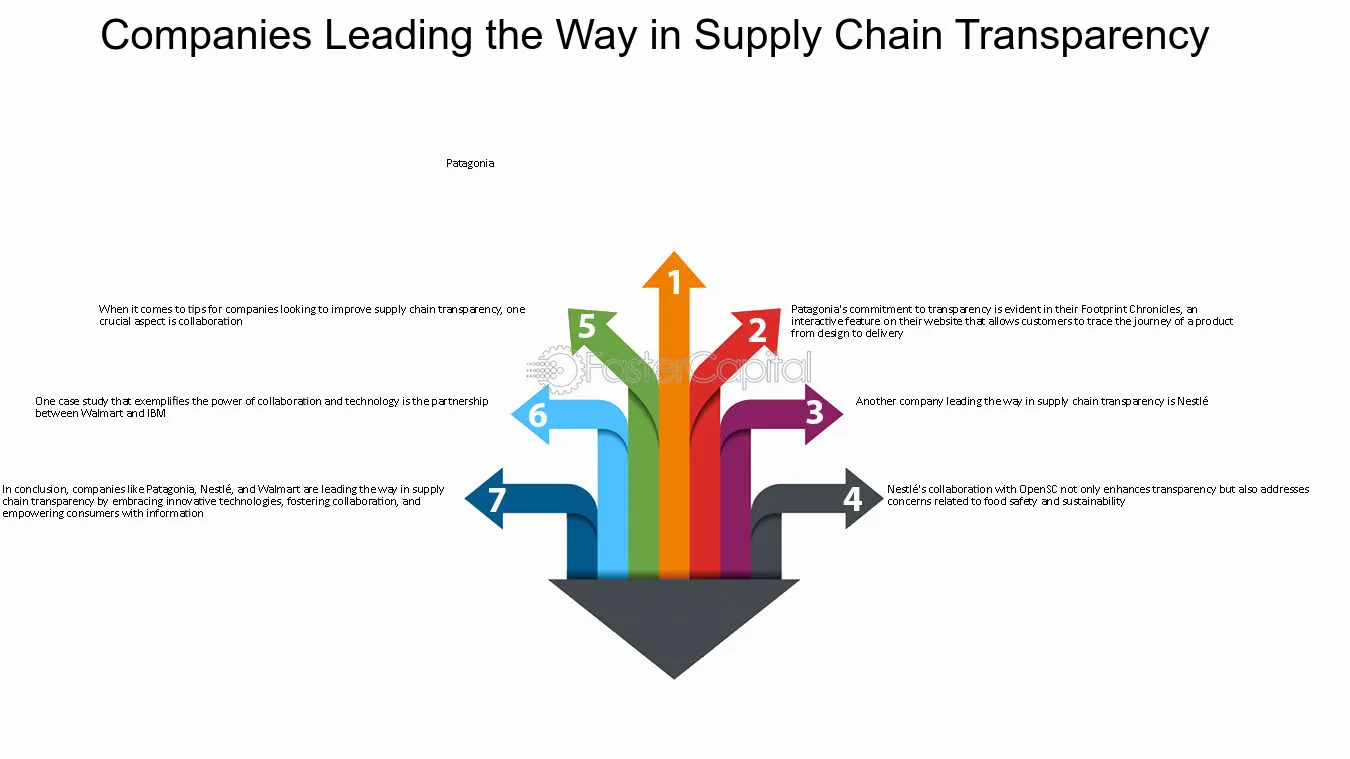
Companies Leading the Way in Supply Chain Transparency - Supply chain transparency: Unveiling the Chain
11. Mutual companies leading the way in sustainable growth
Mutual companies are a unique type of business organization that is owned by its policyholders or members. They operate differently from publicly-traded companies, which have shareholders to whom they are accountable. Mutual companies focus more on their customers and policyholders, which makes them more aligned with their stakeholders' interests. Mutual companies are increasingly becoming leaders in sustainable growth, as they are more inclined to consider the long-term impact of their decisions on the environment, society, and the economy. In this section, we will discuss the reasons why mutual companies are leading the way in sustainable growth from different perspectives.
1. long-term commitment: Mutual companies are known for their long-term commitment to their policyholders. This commitment has led them to take a more sustainable approach to their business practices. For example, some mutual insurance companies have been investing in renewable energy projects that reduce their carbon footprint and help to mitigate the effects of climate change. The investments in these types of projects are in line with the interests of their policyholders and contribute to sustainable growth.
2. Customer focus: Mutual companies are owned by their policyholders, and this ownership structure creates a customer-centric approach to business. Mutual companies are more inclined to listen to their policyholders' concerns and adapt their business practices to meet their needs. This approach has led mutual companies to offer sustainable products and services that are aligned with their customers' values. For example, some mutual banks have developed eco-friendly banking products that encourage customers to adopt more sustainable financial practices.
3. Strong corporate governance: Mutual companies have a unique governance structure that is different from publicly-traded companies. They are governed by their policyholders, which creates a strong sense of accountability to their stakeholders. This accountability has led mutual companies to adopt more sustainable business practices, as they are aware of the impact their decisions have on their policyholders and the wider community. For example, some mutual insurance companies have established sustainability committees that oversee the company's environmental, social, and governance (ESG) performance.
4. Social responsibility: Mutual companies are committed to being socially responsible and making a positive impact on the communities they serve. This commitment has led mutual companies to invest in sustainable projects that benefit their local communities. For example, some mutual banks have provided funding for community-based renewable energy projects that benefit their customers and the wider community.
Mutual companies are well-positioned to lead the way in sustainable growth. Their unique ownership structure, customer focus, strong corporate governance, and social responsibility make them more inclined to adopt sustainable business practices. Mutual companies are increasingly becoming leaders in sustainable growth, and their commitment to sustainability will continue to shape the future of business.
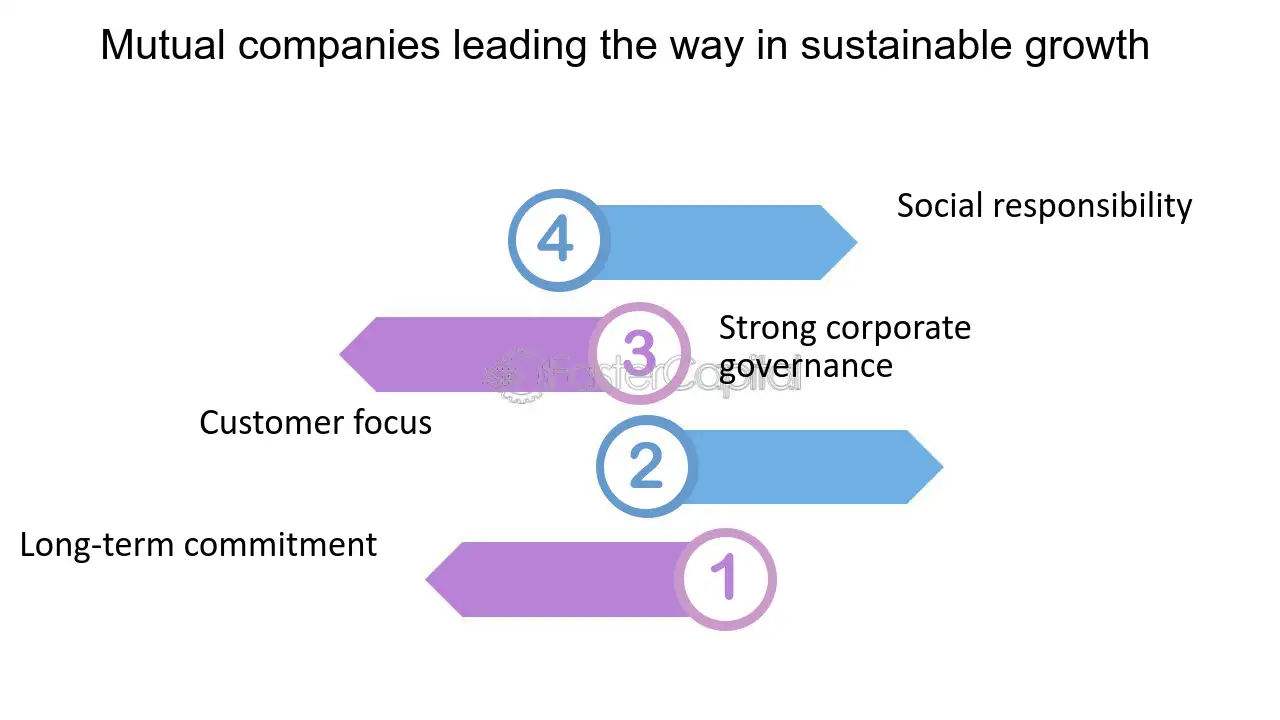
Mutual companies leading the way in sustainable growth - Sustainability: Sustainable Growth: Mutual Companies Leading the Way
12. The Fortune 100 Companies Leading the Way
The Fortune 100 companies are among the most influential and profitable businesses in the world. With their massive impact on the global economy and society, these companies are also expected to play a significant role in philanthropic initiatives. Philanthropy has become an essential part of the corporate culture, and many companies have realized that their social responsibility extends beyond their bottom line. The Fortune 100 companies have been leading the way in philanthropy by supporting various causes and making a positive impact on communities worldwide.
Here are some of the ways in which the Fortune 100 companies are contributing to philanthropic efforts:
1. Corporate Giving: Many Fortune 100 companies have established foundations or charitable giving programs that support various causes. For example, the Walmart Foundation has donated over $1.4 billion to support causes such as education, hunger relief, and disaster response. Similarly, the Coca-Cola Foundation has donated over $1 billion to support sustainable communities, water stewardship, and empowering women.
2. Employee Volunteerism: Many Fortune 100 companies encourage their employees to get involved in volunteer activities to support local communities. For instance, Microsoft's Employee Giving Program matches employee donations and offers paid time off for volunteer work. Similarly, Google has a dedicated platform for employee volunteering and offers grants for employee-led projects.
3. Social Impact Programs: Many Fortune 100 companies have launched social impact programs to address social and environmental issues. For example, Procter & Gamble has launched a program called "Ambition 2030" that aims to reduce the company's environmental footprint and improve the lives of people around the world. Similarly, IBM has launched a program called "P-TECH" that aims to provide students with the skills and education needed to succeed in the digital economy.
4. Cause Marketing: Many Fortune 100 companies use their marketing campaigns to support social causes. For instance, Nike's "Dream Crazy" campaign featuring Colin Kaepernick aims to raise awareness about social justice issues. Similarly, Apple's "Product Red" campaign supports the fight against AIDS by donating a portion of the sales of certain products to the Global Fund.
5. Partnerships: Many Fortune 100 companies partner with non-profit organizations, governments, and other businesses to support social causes. For example, Johnson & Johnson partners with organizations such as Save the Children and UNICEF to support maternal and child health. Similarly, Bank of America partners with non-profits such as Feeding America to support hunger relief.
The Fortune 100 companies have been leading the way in philanthropy by supporting various causes and making a positive impact on communities worldwide. Through their corporate giving, employee volunteerism, social impact programs, cause marketing, and partnerships, these companies have shown that they take their social responsibility seriously and are committed to making a difference.
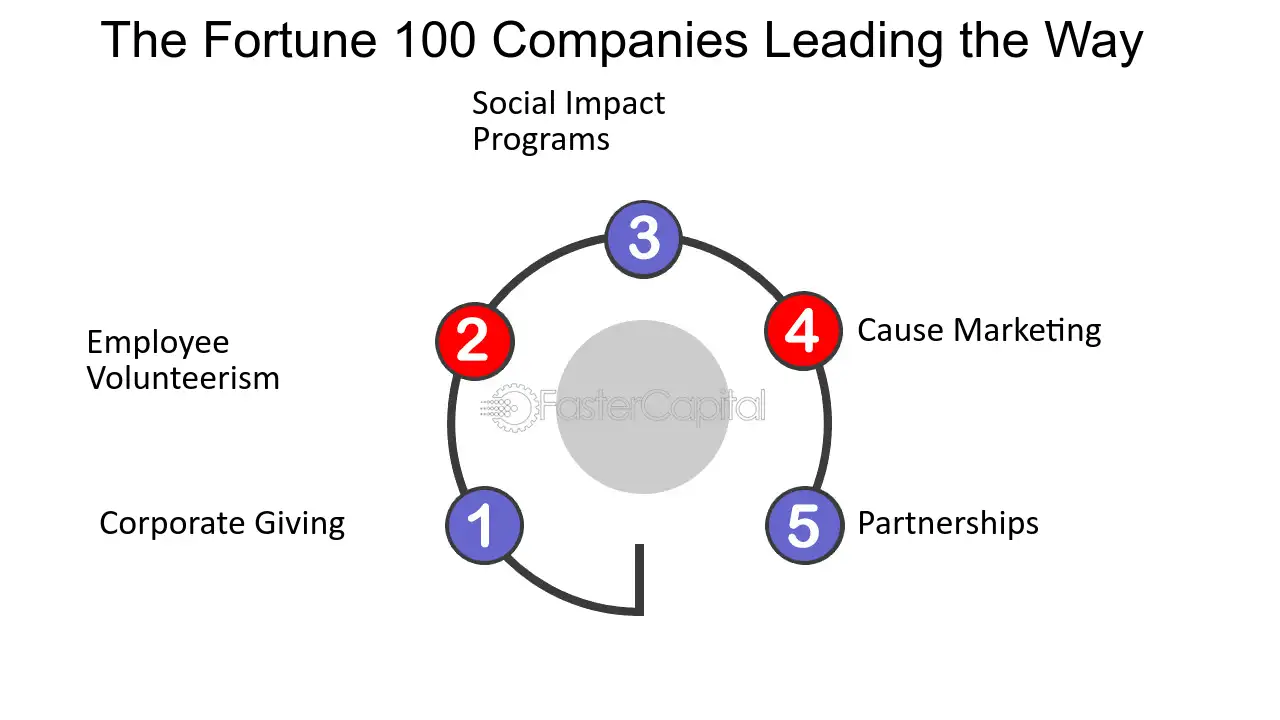
The Fortune 100 Companies Leading the Way - The Fortune 100 s philanthropic initiatives: Making a difference
13. Solar Energy: Companies Leading the Charge in Harnessing the Power of the Sun
1. Tesla: Revolutionizing Solar Energy with Innovative Solutions
When it comes to harnessing the power of the sun, Tesla is at the forefront of the clean technology revolution. Through their subsidiary, SolarCity, Tesla offers solar energy solutions for both residential and commercial properties. Their solar panels are sleek and efficient, designed to seamlessly integrate with any building's aesthetics.
But what sets Tesla apart is their energy storage solution, the Powerwall. This cutting-edge technology allows homeowners and businesses to store excess solar energy generated during the day for use during the night or during power outages. By combining solar panels with energy storage, Tesla is paving the way for a future where clean and renewable energy is available 24/7.
2. Sunrun: Making Solar Accessible and Affordable
Sunrun is another company that is leading the charge in making solar energy accessible to everyone. They offer a range of solar energy solutions, including solar leases and power purchase agreements (PPAs). These financing options allow homeowners to go solar without the upfront costs of purchasing the solar panels.
Sunrun also takes care of the installation, monitoring, and maintenance of the solar panels, making it a hassle-free experience for their customers. By making solar energy affordable and hassle-free, Sunrun is helping more people make the switch to clean and renewable energy.
3. First Solar: Pushing the Boundaries of Solar Technology
First Solar is a global leader in manufacturing advanced thin-film solar modules. Their solar panels are known for their high efficiency, durability, and low environmental impact. They have developed proprietary technology that allows them to produce solar panels with a lower carbon footprint compared to traditional solar panels.
First Solar is also committed to sustainability throughout their manufacturing process. They have implemented recycling programs to reduce waste and have set ambitious goals to minimize their environmental impact. By pushing the boundaries of solar technology and prioritizing sustainability, First Solar is driving the clean energy industry forward.
4. SunPower: Maximizing Solar Energy Generation
SunPower is recognized for their industry-leading solar panel efficiency. Their panels are designed to generate more electricity per square foot compared to conventional solar panels. This means that SunPower customers can generate more energy and maximize their return on investment.
In addition to high-efficiency solar panels, SunPower offers innovative solar tracking systems that follow the sun's path throughout the day. By optimizing the angle of the panels relative to the sun, SunPower's tracking systems can increase energy generation by up to 25%. With their focus on maximizing solar energy generation, SunPower is helping businesses and homeowners get the most out of their solar installations.
5. Canadian Solar: A Global Player in Solar Energy
Canadian Solar is a leading manufacturer of solar panels with a global presence. They have a diverse portfolio of solar products, ranging from traditional crystalline silicon modules to innovative bifacial modules that can generate electricity from both sides.
What sets Canadian Solar apart is their commitment to quality and reliability. They have rigorous quality control processes in place to ensure that their solar panels meet the highest industry standards. With their global reach and focus on quality, Canadian Solar is contributing to the widespread adoption of solar energy worldwide.
In conclusion, these companies are at the forefront of harnessing the power of the sun and driving the clean technology revolution. Through their innovative solutions, affordability, advanced technology, and commitment to sustainability, they are paving the way for a future powered by clean and renewable energy.

Solar Energy: Companies Leading the Charge in Harnessing the Power of the Sun - The Top 10 Clean Technology Businesses Leading the Green Revolution
14. Companies Leading the Way in Transparent Pricing
In this section, we will be discussing some of the companies that are leading the way when it comes to transparent pricing. These companies have recognized the importance of clear pricing structures and have taken steps to ensure that their customers know exactly what they are paying for. By doing so, they have not only gained the trust of their customers but have also set an example for other businesses to follow.
1. Buffer
Buffer is a social media management platform that has gained a reputation for its transparent pricing. The company offers a simple pricing structure that is based on the number of social media accounts that a user wants to manage. The pricing is clearly displayed on the company's website, and there are no hidden fees or charges. Buffer also offers a free trial, which allows users to test the platform before committing to a paid plan.
2. Basecamp
Basecamp is a project management tool that has also gained recognition for its transparent pricing. The company offers a flat fee of $99 per month, regardless of the number of users or projects. This pricing structure is simple and easy to understand, and there are no hidden fees or charges. Basecamp also offers a free trial, which allows users to test the platform before committing to a paid plan.
3. Zapier
Zapier is an automation tool that connects different apps and services. The company offers a free plan, which allows users to create up to 5 "zaps" (automated workflows). For users who need more than 5 zaps, Zapier offers a range of paid plans that are priced based on the number of zaps and the frequency of their use. The pricing is clearly displayed on the company's website, and there are no hidden fees or charges.
4. Square
Square is a payment processing platform that has gained a reputation for its transparent pricing. The company offers a flat fee of 2.6% + 10 cents per transaction for in-person payments and 2.9% + 30 cents per transaction for online payments. There are no monthly fees or long-term contracts, and the pricing is clearly displayed on the company's website. Square also offers a range of additional services, such as invoicing and payroll, which are priced separately.
5. HubSpot
HubSpot is a marketing and sales platform that offers a range of tools and services. The company offers a range of pricing plans, which are based on the specific tools and services that a user needs. The pricing is clearly displayed on the company's website, and there are no hidden fees or charges. HubSpot also offers a free plan, which allows users to test the platform before committing to a paid plan.
When it comes to transparent pricing, there are a few key factors to consider. Firstly, the pricing should be simple and easy to understand. Customers should be able to see exactly what they are paying for and why. Secondly, there should be no hidden fees or charges. Customers should be able to trust that the pricing they see is the pricing they will pay. Finally, companies should offer a free trial or demo, which allows customers to test the platform before committing to a paid plan.
These companies have set an example for others to follow when it comes to transparent pricing. By offering simple pricing structures, no hidden fees or charges, and free trials or demos, they have gained the trust of their customers and set themselves apart from their competitors.
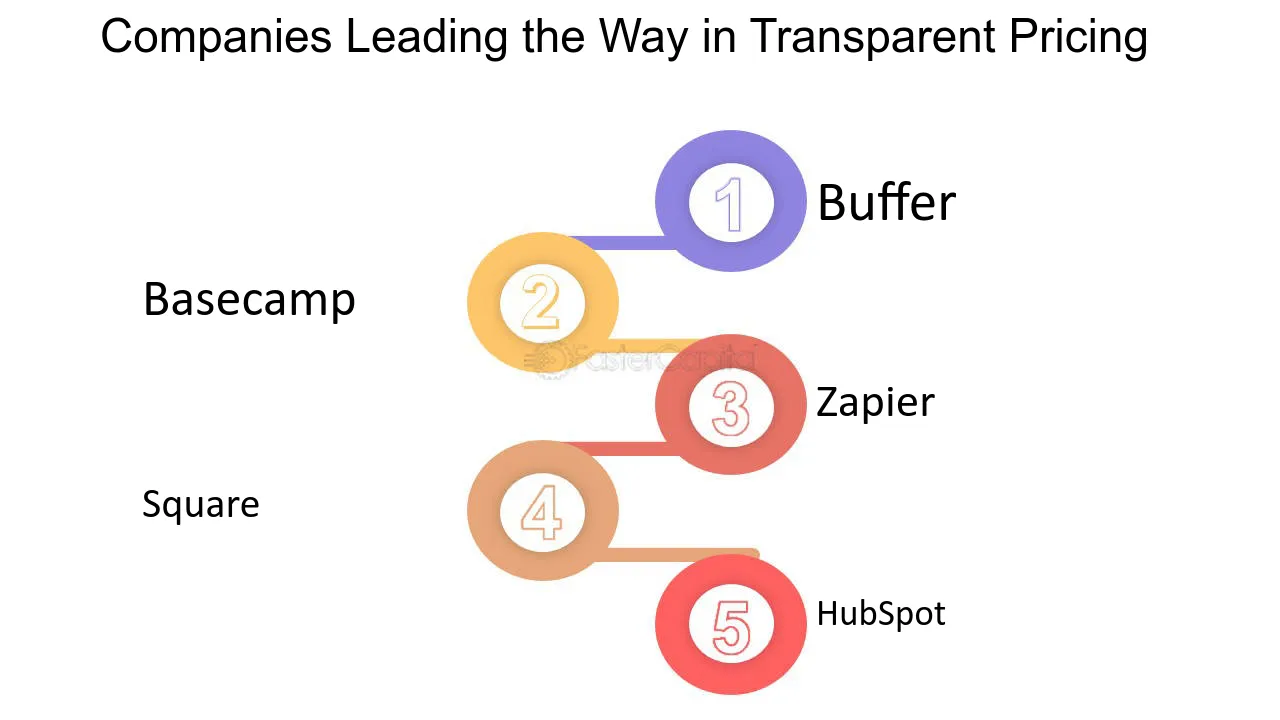
Companies Leading the Way in Transparent Pricing - Utilization Fee Transparency: The Importance of Clear Pricing Structures
15. The Key Players in the Sustainable Movement:E-waste Management: Tech Companies Leading the Way
1. Apple: Pioneering E-waste Initiatives
Tech giant Apple has been leading the way when it comes to e-waste management. The company has implemented several initiatives to ensure the responsible disposal and recycling of their electronic products. One notable example is their Apple Trade-In program, which allows customers to trade in their old devices for credit toward the purchase of a new one. These devices are then either refurbished and resold, or recycled in an environmentally friendly manner.
In addition, Apple has made significant strides in improving the recyclability of their products. For instance, they have developed a robot named Daisy that can disassemble iPhones to recover valuable materials such as gold, silver, and copper. This innovative technology enables Apple to recover more materials from old devices, reducing the need for mining and minimizing the environmental impact of their products.
2. Google: Commitment to Circular Economy
Google is another tech company that has made substantial efforts to tackle e-waste. They have a dedicated team working on sustainable product design and recycling initiatives. Google's commitment to the circular economy is evident in their approach to manufacturing their devices. They prioritize using recycled materials whenever possible and ensure that their products are easily repairable and recyclable.
One of Google's most notable initiatives is their partnership with electronics recycler ERI. Through this collaboration, Google ensures that all of their electronic waste is responsibly recycled, with a focus on recovering valuable materials and reducing the environmental impact. They also offer their customers the option to trade in their old devices for credit toward the purchase of new ones, similar to Apple's Trade-In program.
3. Microsoft: Closing the Loop on E-waste
Microsoft is another tech company that is actively involved in e-waste management. They have implemented a program called Microsoft Authorized Refurbishers (MAR) to extend the life cycle of their products. These authorized refurbishers take in used Microsoft devices, refurbish them, and sell them at a lower cost, extending their lifespan and reducing e-waste.
Moreover, Microsoft has made significant strides in designing their products with recycling in mind. They have been working on developing modular devices that allow for easier disassembly and recycling. By making their products more recyclable, Microsoft aims to reduce the amount of e-waste that ends up in landfills.
4. Dell: Commitment to a Circular Economy
Dell is a tech company that has long been committed to sustainable practices, including e-waste management. They have set ambitious goals to increase the amount of recycled materials used in their products and ensure that their devices are easily recyclable at the end of their life cycle.
Dell also offers a range of recycling programs for their customers, including free recycling for Dell-branded products and a trade-in program for old devices. Through these initiatives, Dell aims to create a closed-loop system where materials from old devices are reused in the production of new ones, minimizing the need for virgin materials and reducing e-waste.
In conclusion, tech companies are taking the lead in e-waste management by implementing innovative initiatives and adopting sustainable practices. Apple, Google, Microsoft, and Dell are just a few examples of companies that are actively working towards reducing e-waste and promoting a more circular economy. By prioritizing responsible disposal, recycling, and the use of recycled materials, these tech companies are setting an example for others to follow in the pursuit of a more sustainable future.
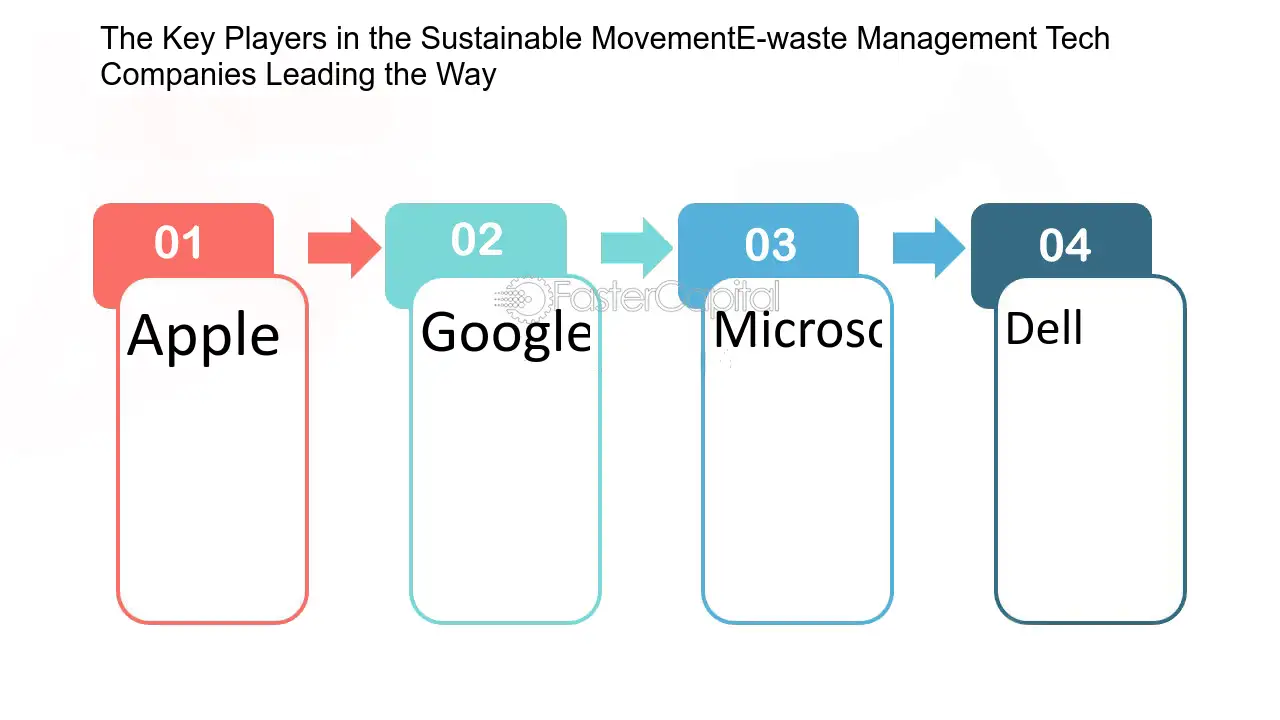
The Key Players in the Sustainable Movement:E waste Management: Tech Companies Leading the Way - Zero Waste Startups: The Key Players in the Sustainable Movement